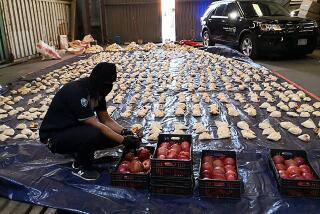Opium Trade Still Entrenched Across Desperate Afghanistan
- Share via
KABUL, Afghanistan — Mohammed Sher Akha drove up to the police checkpoint like a lamb going to be sheared. The officer unzipped Akha’s duffel bag and pulled out a clear plastic bag full of raw opium.
“I’m married and my father-in-law said I had to pay for the wedding,” said Akha, trying to explain the package. “I’m 200,000 Afghanis [$4,000] in debt. I am a farm laborer and I pick poppy.”
The burdens of paying for an expensive wedding did not impress the counter-narcotics officers staffing the checkpoint on the outskirts of the capital. The newly trained unit said the opium had been on its way to a laboratory in the remote northern province of Badakshan to be processed into heroin.
“The other day we opened a car full of watermelons, and some of the fruit had been carved in half and heroin hidden inside,” said one of the officers as they took Akha away for questioning.
For the last three years, the American-led coalition in Afghanistan has tried to pacify the country while fighting the Taliban, which the allies ousted from power.
The British have taken the lead in eradicating the poppy cultivation, the basis of the resurgent drug trade. Experts believe that profits from the drugs are funding terrorist activities by the Taliban and Hizb-i-Islami.
To fight the trade, Germans, British and French are helping set up a counter-narcotics police force whose duties include searches at vehicle checkpoints, an eradication unit that destroys crops and a force trained by British SAS commandos.
But those efforts are too recent to put a dent in an industry that earned farmers and traffickers $2.3 billion last year, more than half the country’s gross domestic product, according to United Nations estimates.
Mirwais Yasini, director-general of the Counter Narcotics Directorate, said he aimed to wipe out poppy cultivation in the next eight years.
Some drug experts believe Hizb-i-Islami, a terrorist group headed by warlord Gulbuddin Hekmatyar, earns money from 10% to 15% of the opium crops, and channels $120 million a year to Islamist groups in Chechnya and Uzbekistan.
“We have a lot of information that there are overlaps between drug cartels and terrorists,” Yasini said. “We arrested four people, including three wanted on terrorist charges, in an opium storage site in Helmand province in the south. They were involved in road and bomb attacks against [coalition forces] and the central government.”
Last year, 200,000 acres of opium were cultivated. About a dozen industrial-sized heroin labs are in northern, eastern and southern provinces. About 40% of the product, whether raw opium or heroin, was smuggled through northern countries such as Uzbekistan and Tajikistan. About 30% was taken through Iran and Pakistan, a Western diplomat said.
Uzbekistan and Tajikistan “are doing a good job in getting traffickers out, but the traffickers have been pushed into tribal border areas of Pakistan,” he said. “The Pakistanis are in a league of their own when it comes to finding the traffickers. They are doing badly.”
The Western diplomat said Pakistan’s Inter-Services Intelligence agency may be to blame. District officials in southern and eastern Afghanistan are believed to be paid off by traffickers to help them move opium across the border by donkey and mule. Once across, it may be consolidated with the help of the ISI, he said.
“Whose business is it to know what happens on the borders? The ISI and military,” he said. “It’s not proven, but [there is] enough anecdotal evidence of ISI involvement in the opium trade.
“Who are these people connected to? The Taliban, for one.”
But to Mir Mohammed, another smuggler pulled over by the counter-narcotics police in Kabul, the cycle of poverty in which his family lives is far removed from the Taliban insurgency.
He looked ashamed when the police officers found a heavy package wrapped in bright blue cotton under the car seats. Five yellow packets containing nearly 29 pounds of raw opium tumbled out of the bag.
His wife, shrouded in a burka, the head-to-toe covering, leaned her head against the door and began crying.
“My wife here has heart disease, and I bought the opium in Baghlan [a northern province] to sell and pay for her treatment,” said Mir Mohammed, 48. “We have so many problems.”
He added, “But now I have even more problems because I’ve been caught.”
More to Read
Sign up for Essential California
The most important California stories and recommendations in your inbox every morning.
You may occasionally receive promotional content from the Los Angeles Times.












